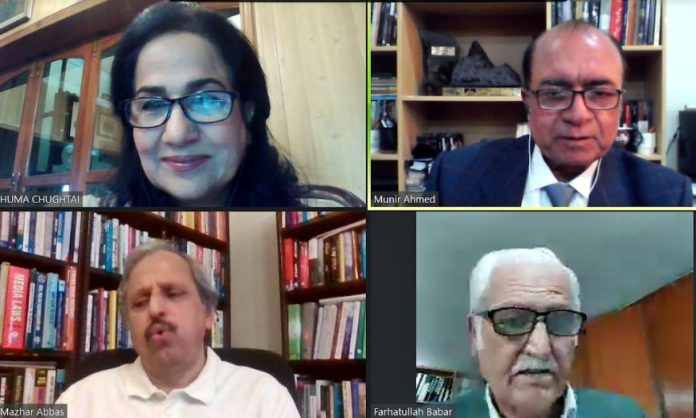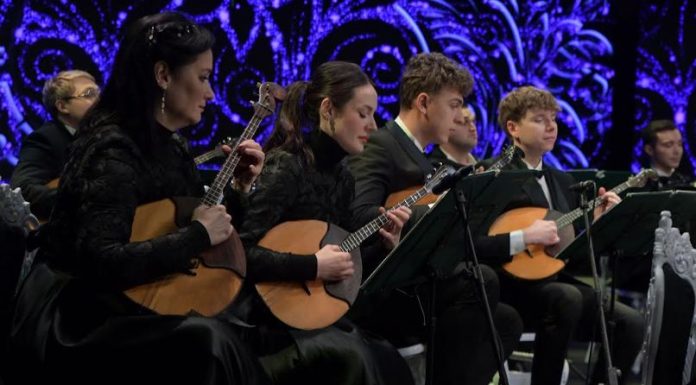DNA
Devcom-Pakistan webinar suggests a larger consultative process to resolve political confrontation sans politically motivated judicial imperialism. The judges of the supreme court too shall adhere to its code of conduct.
Islamabad, APR 8: A panel of experts at a webinar suggested the state institutions to understand the implications of their politically motivated conflicts on socioeconomic deterioration, and its dent to the democratic instability. Overstepping on other’s jurisdiction has created chaos and extreme divides. A larger consultative process among the political parties shall help cool down the political temperature, while the judges shall adhere to the code of conduct.
The webinar entitled “Judicial imperialism in Pakistan and its impact on society” was organized by DTN and Devcom-Pakistan (Development Communications Network) on Saturday. The panel of experts included Senator retired Farhatullah Babar, senior journalist Mazhar Abbas, Human Rights Law expert Huma Chughtai and Devcom-Pakistan Executive Director Munir Ahmed.
Senator Farhatullah Babar said the chaos began in 2009 with a statement of then Chief Justice of Pakistan that “parliament is not supreme but the constitution the way it is interpreted by the Supreme Council of Pakistan.” The 19th amendment axed the powers of parliament to oversight the judiciary including the appointment of judges that caused concentration of like-minded or favourite judges in the courts.
Chief Justice Iftikhar Muhammad Chaudhary elevated 126 judges while ousted over 100 judges only by his own will. It was the beginning of judicial imperialism in Pakistan. Most of the Suo Moto actions were taken in his tenure under the Constitution’s article 184(3). The same practice continued by Justice Saqib Nisar, Justice Asif Khosa and the present one, Chief Justice Umar Atta Bandial.
Farhatullah Babar said the rational jurisprudence makes the judiciary more pertinent for interpretation of the laws but since 2009, we have evolved an omnipotent judiciary. The 19th amendment has granted a veto to the chief justice for Suo Moto action only by his will. The judiciary has sent three prime ministers back home using the authoritative Suo Moto. He suggested a larger consultative process among the political forces to end the present crisis. The Supreme Court judges shall also talk to each other to end their rifts too.
Mazhar Abbas said the media played its glamourized Suo Moto actions since 2009 while the chief justices were caught up by the media phobia. The lawyers’ activism too played its role in the build up of the judicial chaos. The lawyers-activism could not stop after the Nawaz Sharif long march for the restoration of the chief justice Iftikhar Muhammad Chaudhary. Since 2008, even the elected parliaments could not restrict the Suo Motu powers of the chief justice though former president Asif Zardari could do it. Judges’ political support has created unpresented polarization and divided not only in the political arena but in the judiciary itself. Dialogue is the only solution for political parties while strict adherence to the code of conduct for the judges. He urged to scrap the designations of the PCO Judges who took their oath of offices under the Provisional Constitutional Orders, and stop their pensions and other benefits.
Huma Chughtai said the state institutions need to define their turf and avoid overstepping into other’s jurisdiction. Lawmaking in Pakistan had never been strong enough to restrict judicial activism, rather it was apologetic. direction. Pakistan’s judiciary has become an “elite club” where the subordinate or district judiciary has no representation. Judges in the high court and supreme court were appointed on favouritism. It has created groups within the courts while activism has taken to extremes. Judges need to pull them out of the chaos, divide and polarization.
Devcom-Pakistan Executive Director Munir Ahmed said Pakistan is a victim of a one-man power show that has led the country to judicial imperialism. It is unpresented even in South Asia. Supreme courts of our neighbouring countries take Suo Moto through consultative process. It is not exercised anywhere in the world for political maneuvering except in Pakistan. Parliament shall be the supreme and it shall come up with unanimous legislation to curb the judicial dictatorship.












